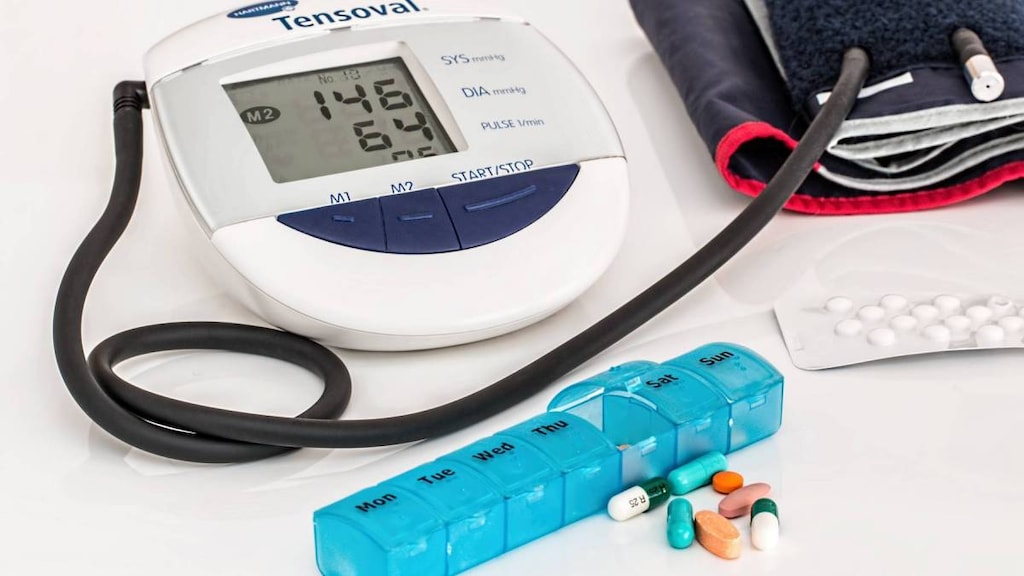COVID-19: Severe cases linked to metabolic syndrome, cardiovascular disease and type 2 diabetes

Hospital stats paint a somewhat bleak picture for people with metabolic syndrome and associated diseases, such as cardiovascular disease and type 2 diabetes, who develop COVID-19. This is of particular concern given that more than a third of all adults in the US are thought to have metabolic syndrome.
What is metabolic syndrome?
Metabolic syndrome is a name given to a group of components or risk factors that put you at increased risk of developing diseases such as cardiovascular disease and type 2 diabetes.
Components or risk factors of metabolic syndrome* include:
- Hypertension - having high blood pressure
-
Abdominal obesity - a large waistline or being apple shaped
-
Insulin resistance or high blood sugars - signs that prediabetes may be developing
-
High triglycerides
-
Low high-density lipoprotein (HDL) cholesterol - low ‘good’ cholesterol
*A diagnosis of metabolic syndrome requires a patient to have 3 of these risk factors.
Metabolic syndrome is considered a precursor of cardiovascular disease and type 2 diabetes, which about 48% and 12%, respectively, of the adult population in the US suffer from. One study which followed 3323 middle-aged adults for 8 years found that metabolic syndrome accounted for up to a third of new cases of cardiovascular disease in men and about half of the new cases of type 2 diabetes. More than 80% of people in the US who are over 50 years old and have type 2 diabetes are thought to have metabolic syndrome.
Patients with metabolic syndrome and associated diseases are at increased risk from COVID-19
The US Centers for Disease Control and Prevention (CDC) has provided information on the underlying conditions seen in 1482 patients with severe COVID-19 requiring hospitalization during March 2020. Details of underlying conditions were available for 12.1% of patients and showed the following.
| Underlying Conditions | Percentage COVID-19 Patients with Condition |
| Hypertension (a component of metabolic syndrome) |
49.7% Most prevalent underlying condition in patients aged 65 years and older |
|
Obesity |
48.3% Most prevalent underlying condition in patients less than 65 years old |
| Diabetes | 28.3% |
| Cardiovascular disease | 27.8% |
Hypertension was the most common underlying condition reported in older COVID-19 patients, however, the most common underlying condition observed in those less than 65 years old was obesity.
Researchers in New York have also looked into 4103 cases of COVID-19, of which 48.7% were hospitalized. Obese patients, especially those with severe obesity (BMI or body mass index >40), were found to be at greater risk of ending up in hospital. Severe obesity was the second most common predictor of hospitalization after age, with those over 75 years of age being most at risk.
The researchers also found that patients with signs of inflammation were among those most likely to become critically ill. Interestingly, metabolic syndrome is known to be accompanied by a pro-inflammatory state and chronic low-grade inflammation is also associated with obesity.
Inflammation has been identified as a complication of key concern in patients with COVID-19 and is linked to the development of blood clots (thrombosis). A pro-thrombotic state is also a component of metabolic syndrome. Metabolic syndrome puts people at increased risk of developing further blood clots, according to the results of a study conducted in people with deep vein thrombosis (DVT).
On April 17, 2020, the UK Intensive Care National Audit & Research Centre (ICNARC) provided an update on COVID-19 cases requiring admission to critical care in the UK. The report doesn’t outline how many of the critical care cases had hypertension, diabetes and cardiovascular disease in the same way as the US data does. However, it does show that for the 2638 cases for which a BMI was reported, nearly 74% were overweight or obese.
Italy has also reported that hypertension (76.1%), diabetes (35.5%) and heart disease (approx. 33.3%) were common in patients who died from COVID-19.
Protecting yourself from COVID-19 if you have metabolic syndrome, cardiovascular disease or type 2 diabetes
While adopting a healthy diet and lifestyle will provide health benefits in the future, right now prevention is the key for people with metabolic syndrome, cardiovascular disease and diabetes during the COVID-19 pandemic.
When it comes to minimizing your risk of catching COVID-19, the disease caused by the new coronavirus SARS-CoV-2, it is best to follow the advice of the CDC and:
-
Stay at home as much as possible and avoid close contact with others
-
Practice social distancing and wear a mask when you go out
Article references
- NIH, National Heart, Lung and Blood Institute. Metabolic Syndrome. Available at: https://www.nhlbi.nih.gov/health-topics/metabolic-syndrome. [Accessed April 21, 2020].
- Grundy SM, Brewer JR HB, Cleeman JI, et al. Definition of Metabolic Syndrome. Report of the National Heart, Lung, and Blood Institute/American Heart Association Conference on Scientific Issues Related to Definition. Circulation. 2004;109:433–438. https://doi.org/10.1161/01.CIR.0000111245.75752.C6.
- Vykoukal D, Davies MG. Vascular biology of metabolic syndrome. Journal of Vascular Surgery. September 2011. 54(3),p819-831. https://doi.org/10.1016/j.jvs.2011.01.003.
- Benjamin EJ, Munter P, Alonso A, et al. Heart Disease and Stroke Statistics—2019 Update: A Report From the American Heart Association. Circulation. 2019;139:e56–e528. https://doi.org/10.1161/CIR.0000000000000659.
- Centers for Disease Control and Prevention (CDC). National Diabetes Statistics Report 2020. Estimates of Diabetes and Its Burden in the United States. Available at: https://www.cdc.gov/diabetes/pdfs/data/statistics/national-diabetes-statistics-report.pdf. [Accessed April 21, 2020].
- Wilson PWF, D'Agostino RB, Parise H, et al. Metabolic Syndrome as a Precursor of Cardiovascular Disease and Type 2 Diabetes Mellitus. Circulation. 2005;112:3066–3072. https://doi.org/10.1161/CIRCULATIONAHA.105.539528.
- Shin JA, Lee JH, Lim SY, et al. Metabolic syndrome as a predictor of type 2 diabetes, and its clinical interpretations and usefulness. J Diabetes Investig. 2013 Jul 8; 4(4): 334–343. doi: 10.1111/jdi.12075.
- Bornstein SR, Dalan R, Hopkins D. et al. Endocrine and metabolic link to coronavirus infection. Nat Rev Endocrinol. April 2, 2020. https://doi.org/10.1038/s41574-020-0353-9. [Accessed April 21, 2020].
- Centers for Disease Control and Prevention (CDC). Hospitalization Rates and Characteristics of Patients Hospitalized with Laboratory-Confirmed Coronavirus Disease 2019 - COVID-NET, 14 States, March 1-30, 2020. April 17, 2020. Available at: https://www.cdc.gov/mmwr/volumes/69/wr/mm6915e3.htm?s_cid=mm6915e3_w. [Accessed April 21, 2020].
- Petrilli CM, Jones SA, Yang J, et al. Factors associated with hospitalization and critical illness among 4,103 patients with Covid-19 disease in New York City. medRxiv preprint. April 11, 2020. doi: https://doi.org/10.1101/2020.04.08.20057794. [Accessed April 21, 2020].
- Stewart LK, Kline JA. Metabolic syndrome increases risk of venous thromboembolism recurrence after acute deep vein thrombosis. Blood Adv. 2020 Jan 14; 4(1): 127–135. doi: 10.1182/bloodadvances.2019000561.
- Intensive Care National Audit & Research Centre, ICNARC. ICNARC report on COVID-19 in critical care. April 17, 2020. Available at: https://www.icnarc.org/dataservices/attachments/download/c9b491af-ea80-ea11-9124-00505601089b. [Accessed April 21, 2020].
- Business Insider Australia. 10 common health conditions that may increase risk of death from the coronavirus, including diabetes and heart disease. March 24, 2020. Available at: https://www.businessinsider.com.au/hypertension-diabetes-conditions-that-make-coronavirus-more-deadly-2020-3?r=US&IR=T. [Accessed April 21, 2020].
- Centers for Disease Control and Prevention (CDC). Coronavirus Disease 2019 (COVID-19). Protect Yourself. Available at: https://www.cdc.gov/coronavirus/2019-ncov/prevent-getting-sick/prevention.html. [Accessed April 21, 2020].




